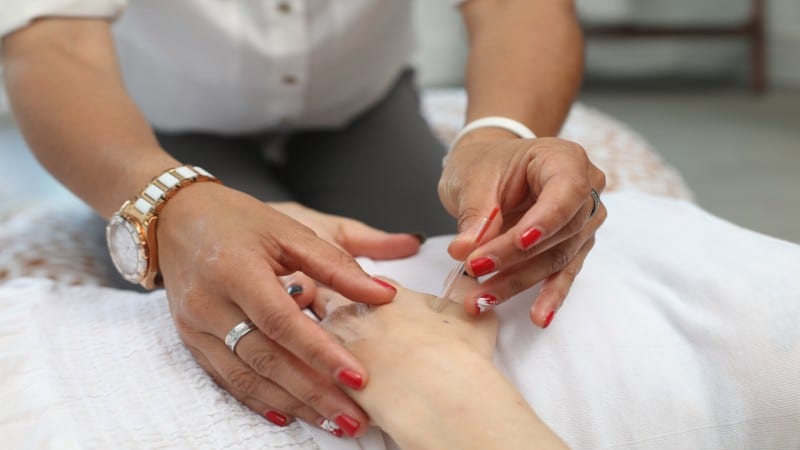There are some alternative cancer treatments that are worth trying. One of them is definitely acupuncture, an ancient medical treatment originating in China.
As scientific evidence increasingly supports the value of acupuncture, this therapy has gradually been incorporated into modern mainstream medical care. Talk to your doctor if you’re interested in trying acupuncture. Ask your doctor to recommend a practitioner of acupuncture at your home town.
During acupuncture treatment, a skilled practitioner inserts tiny, sterile needles into your skin at precise points. Acupuncture is a low-risk treatment. There is a small health risk only if you’re taking blood thinners or if you have low blood counts, so check with your doctor first.
Large clinical trials support the efficacy of acupuncture as a treatment for various cancer-related symptoms. Acupuncture is gaining momentum and acceptance as a valid intervention in medical practice. Randomized clinical trials (RCT) have demonstrated that acupuncture may be helpful in relieving nausea and vomiting caused by chemotherapy. Acupuncture may also help relieve certain types of pain in people with cancer and quicken recovery time.
Acupuncture has been reported to reduce symptoms of severe dry mouth caused by salivary gland injury from radiation therapy for head and neck cancer.
Interestingly, studies indicate that acupuncture treatment may be an equally effective alternative treatment modality to drugs in patients suffering from mild depression. Suppression of anxiety by acupuncture may be associated with an increase in the pain threshold. Acupuncture may also play a role in the treatment of fatigue through the modulation of cytokines and hormones.
Multiple animal and clinical studies have suggested that acupuncture has a positive immune-modulating effect in cancer patients. In these studies, acupuncture has been shown for example to increase T-lymphocyte proliferation and increase natural killer cell activities.
Acupuncture may stimulate steroid levels and other hormones, such as melatonin, somatostatin, and vasoactive intestinal peptide, which could potentially have anti-tumor effects. Acupuncture can reduce the hot flushes associated with anti-cancer hormone therapy.
The mechanism of action of acupuncture has been of great interest to many researchers. Numerous mechanistic studies of acupuncture in animal models and humans suggest that the effect of acupuncture is primarily based on stimulation to and the responses of the neuroendocrine system involving the central and peripheral nervous systems. Acupuncture stimulation of specific points on the body releases neuropeptides (such as somatostatin and vasoactive intestinal peptide) within the central nervous system.
Acupuncture points are anatomically defined areas on the skin relative to certain landmarks on the body. The original Chinese pictographs for acupoints indicated that there were holes in the skin through which qi energy could flow. These acupoints can be reliably detected with electrodermal measurements. Although qi is everywhere in the body, it does have main pathways along which it flows, nourishing and warming the organs and body parts, and harmonizing their activity. These channels are called the meridian system. Most acupuncture points are sited along these channels.
References and further reading
Ching Nigel, Buck Charles. The Fundamentals of Acupuncture. Singing Dragon, 2016
Deadman Peter, Al-Khafaji Mazin, Baker Kevin. A Manual of Acupuncture. Journal of Chinese Medicine Publications; 2 edition, 2007
Dundee, J.W., Chestnutt, W.N., Ghaly, R.G. and Lynas, A.G.A. (1986) Traditional Chinese acupuncture: A potentially useful antiemetic? Br. Med. J. 293, 583–584. https://www.ncbi.nlm.nih.gov/pmc/articles/PMC1341376/
Kaptchuk, T.J. (2002) Acupuncture: Theory, efficacy, and practice. Ann. Intern. Med. 136(5), 374–383. https://www.ncbi.nlm.nih.gov/pubmed/11874310
Lee, H., Schmidt, K. and Ernst, E. (2005) Acupuncture for the relief of cancer-related pain: A systematic review. Eur. J. Pain 9, 437–444. https://www.ncbi.nlm.nih.gov/pubmed/15979024
Lu W, Dean-Clower E, Doherty-Gilman A, Rosenthal DS. The value of acupuncture in cancer care. Hematol Oncol Clin North Am. 2008;22(4):631–viii. doi:10.1016/j.hoc.2008.04.005 https://www.ncbi.nlm.nih.gov/pmc/articles/PMC2642987/
Patel, M., Gutzwiller, F., Paccaud, F. and Marazzi, A. (1989) A meta-analysis of acupuncture for chronic pain. Int. J. Epidemiol. 18, 900–906. https://www.ncbi.nlm.nih.gov/pubmed/2695475
Roschke, J., Wolf, C., Muller, M.J., et al. (2000) The benefit from whole body acupuncture in major depression. J. Affect. Disord. 57, 73–81. https://www.ncbi.nlm.nih.gov/pubmed/10708818
Zhou, J.Q., Li, Z.H. and Jin, P.L. (1999) A clinical study on acupuncture for prevention and treatment of toxic side-effects during radiotherapy and chemotherapy. J. Tradit. Chin. Med. 19, 16–21. https://www.ncbi.nlm.nih.gov/pubmed/10453578
![]()
